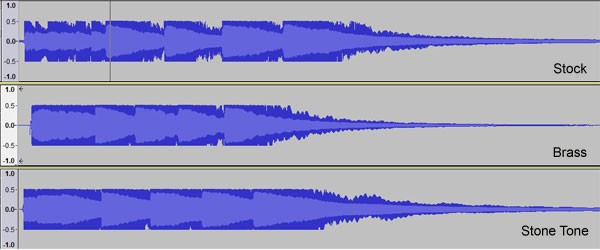I have to state on the onset of this review I am in a way a Floyd Rose newb. No, I am not a newb to tremolos. I have guitars with everything from Bigsby’s to Kahlers. My B. C. Rich Mockingbird is my first journey into the world of Floyd Rose tremolos. What makes Floyd Rose stand out from their competitors is their tremolos can be adorned with a vast array of options. Even within those options there are expediential options when you look at the colors and materials available. Today we are going to look at one of the most frequently modded options on the Floyd Rose, the block.
Sustain blocks for The Floyd Rose come in almost every metal imaginable. Tungsten, brass and titanium are common materials for upgrades. Our focus today is a Floyd Rose sustain block made of granite by Stone Tone.
Manufacturer’s Description: These patented blocks are made of granite and are designed to enhance and strengthen the sound of your tremolo-equipped instrument across the entire audio spectrum. Granite, when quarried in its natural state, is not only of an ideal density for the purpose of sustain, but also has a crystalline atomic structure which is ideal for sonic transference—it requires no factory processing or dilution, and the natural change in sound, upon installation, is so drastic that signal loss from the guitar to the amplifier will be decreased by at least 30%.
The blocks are crafted from Volcano Black Absolute Granite, the compression strength of which is 19,000 psi/130,000 kpa and the tension strength of which is 700 psi/4,800 kpa; this is the 4th densest material on earth, just behind Diamond, Carbon and Quartz!
For this review, we went with a more scientific approach than we usually partake. Like most gear websites our reviews are typically our opinions and experiences with a product. This time, around we set controls and recorded our results with a close eye. We tested .37 mm Stone Tone granite block vs. our zinc stock block and a brass block. As I mentioned earlier, our test guitar is a B. C. Rich Mockingbird with a Floyd Rose Special. The guitar is a set neck mahogany guitar with a maple top. Pushing this tone machine over the top is a prototype set of Lindy Fralin’s Metal SHO pickups. The B. C. Rich was setup and restrung with a fresh set of .09 GHS Boomers after each sustain block swap. We then recorded a few slow strums and a couple of power chords directly to our DAW for analysis.
As you can see in the pictures below the Stone Tone granite block gave us more amplitude and sustain than the zinc and brass blocks. The Stone Tone granite block is not acting as an amplifier. Its design reduces the signal loss thus giving your guitar pickups a wider sonic spectrum to work with.
FIG. 1

Science and tech aside let us get down to brass tacks. How does this block sound? In simple terms significant. The Stone Tone block gave the pickups more of everything to work with. The bass was very well defined, and my mids had an incredible crunch. What I notice most was my highs would not choke out or rapidly fade away. Running down to the bottom of the neck runs were clean and articulate with an incredible amount of sustain.
Let’s keep in mind this guitar had great sustain with the stock block. The brass block showed an improvement. The Stone Tone block not only added more sustain but it was also more natural sounding. The notes bloomed and had a more natural decay. The Stone Tone block gives the guitar a better feel and me as a guitarist more control.
One thing I will often do in my reviews is let another guitarist give me opinions on the piece of gear in question. I let one of the most respected guitarists I know take the Stone Tone for a spin. His approach was interesting in trying the block. He dived in immediately looking for problems. As he navigated the neck and pulled on the tremolo he would shake his head and mutter “this shouldn’t be happening”. He went on to explain different intervals, harmonics, and notes that should have rapidly diminished with the tremolo. With the Stone Tone, those note sung brightly as the tremolo was depressed.
I am more than impressed with this product. With a street price of $110, it is an excellent tonal upgrade for any tremolo player. The Stone Tone has me thinking if I changed my block before I changed my pickups maybe I could have avoided a much more expensive upgrade.
You can learn more about Stone Tone products on their website, Facebook or YouTube page.














